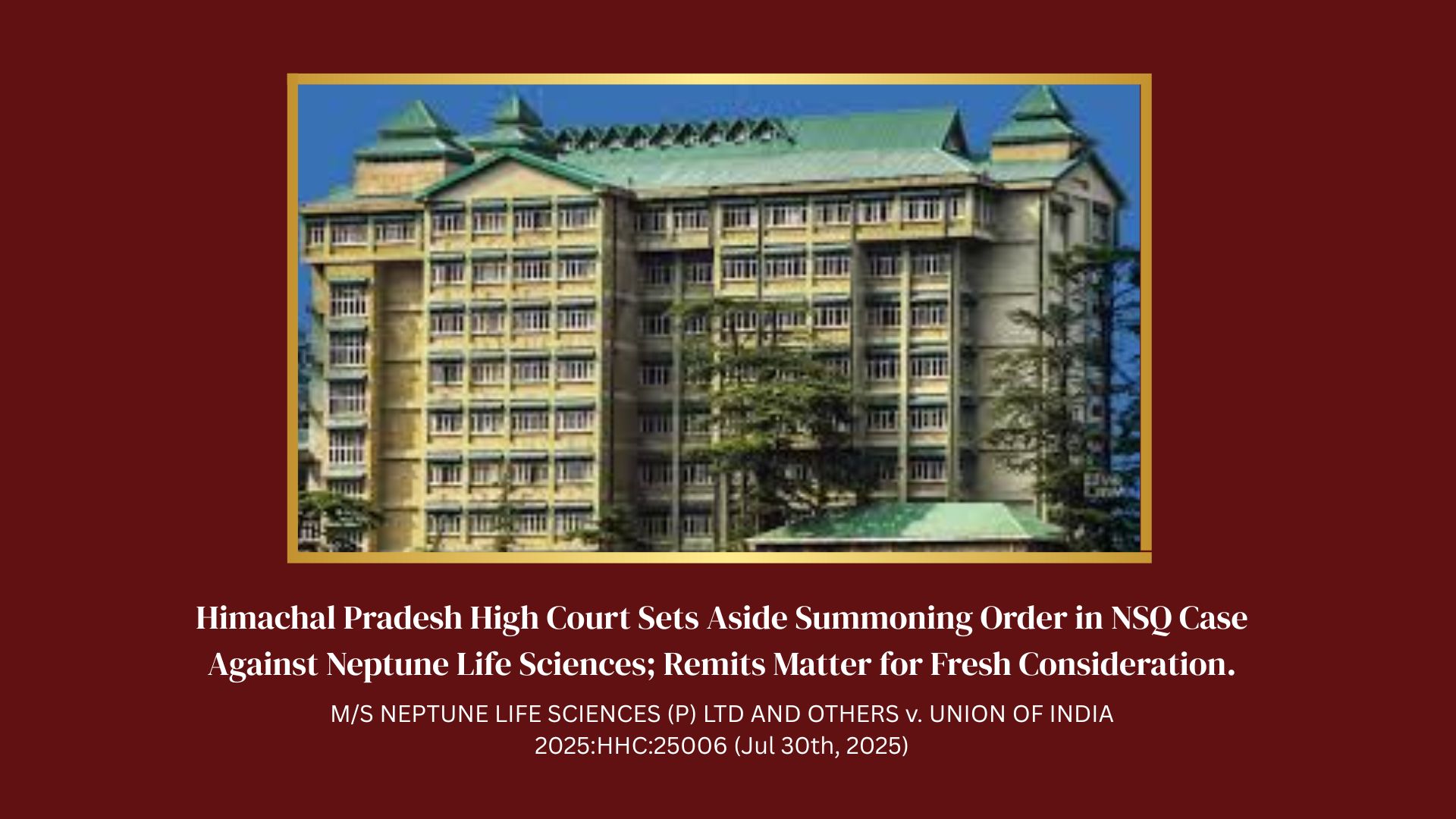
Himachal Pradesh HC Sets Aside Summoning Order in NSQ Case Citing Lack of Application of Mind
M/S NEPTUNE LIFE SCIENCES (P) LTD AND OTHERS v. UNION OF INDIA
2025 HHC 25006
Date of Decision: 30.7.2025
In the present case, the petitioners have approached the High Court seeking to quash Complaint No. 10 of 2024, filed on March 13, 2024, titled Union of India vs. M/s Neptune Life Sciences and others, which is currently pending before the Additional Judicial Magistrate in Nalagarh, District Solan, Himachal Pradesh.
The complaint was initiated by a Drugs Inspector, who alleged that a sample of Chlorhexidine Gluconate Mouthwash I.P. 100 ml. (Dento Fresh), bearing Batch No. NFE458 and manufactured by M/s Neptune Life Sciences Pvt. Ltd., was found to be not of standard quality. Sample was tested by the Government Analyst at the Regional Drugs Testing Laboratory in Chandigarh, who concluded that it did not meet the standards specified under the Indian Pharmacopoeia (IP-2014, addendum 2015) with respect to the assay of Chlorhexidine Gluconate. Following an investigation, the Drugs Inspector filed a complaint under Section 18(a)(vi) read with Section 16 and punishable under Section 27(d) of the Drugs and Cosmetics Act, 1940. The petitioners also challenge previous trial court orders dated January 11, 2022, and December 12, 2023, related to the committal of the case.
It was asserted by the Petitioners that the Drug Inspector was not notified as Drug Inspector in terms of Section 21 of the Drugs Act for the specified area to which the matter pertains, and the complaint filed by him was not maintainable. The Trial Court summoned the petitioners without any application of mind.
It was further argued that, the summoning order was passed in violation of Sections 200 to 204 of the Cr.PC. The case was wrongly committed to learned Additional Sessions Judge, Nalagarh, District Solan, H.P. The Courts at Nalagarh had no jurisdiction as the sample was drawn at Batnala in Punjab. There was no compliance with the requirement of Section 34 of the Drugs Act,1940 and no averment was made regarding the vicarious liability of petitioners Nos. 2 and 3. On the other hand, the Respondent argued that petition is premature and has been filed to put pressure upon them and that it is not maintainable.
Decision
After hearing both the parties the Himachal Pradesh High Court observed that the Magistrate did not need to write a detailed summon order. The relevant para is quoted as under:
Para 8: “This does not mean that the learned Magistrate was required to write a detailed order. It was held by the Hon’ble Supreme Court in Pramila Devi v. State of Jharkhand 2025 SCC OnLine SC 886, that a Magistrate is not supposed to write a detailed order while summoning the accused. It is sufficient that there is an indication that the Magistrate had applied his/her mind”.
To reiterate, the High Court referred to the case of Pramila Devi v. State of Jharkhand 2025 SCC OnLine SC 886, wherein it was held as under:
Para 16. “In the present case, we find that the Additional Judicial Commissioner has taken cognisance while recording a finding that, from a perusal of the case diary and case record, a prima facie case was made out against the accused, including the Appellants. In Bhushan Kumar v. State (NCT of Delhi), (2012) 5 SCC 424, this Court held that an order of the Magistrate taking cognisance cannot be faulted only because it was not a reasoned order; relevant paragraphs being as under:
Para 14. “Time and again, it has been stated by this Court that the summoning order under Section 204 of the Code requires High Court of H.P. no explicit reasons to be stated because it is imperative that the Magistrate must have taken notice of the accusations and applied his mind to the allegations made in the police report and the materials filed therewith.”
DECISION
Accordingly the High Court held as under:
Para 9: “It is undisputed that no challan was filed before the Court of learned Additional Chief Judicial Magistrate, Nalagarh and a complaint under Sections 18(a)(i), 18(a)(b)(i) read with Section 16 punishable under Section 27(d) of the Drugs Act was filed. Hence, the learned Additional Chief Judicial Magistrate erred in stating that he had gone through the challan and the accompanied documents. The fact that he had mentioned in the order that he had gone through the challan shows that he had not applied his mind and passed the order mechanically hence, the order passed by the learned Magistrate is not sustainable.”
The order summoning the petitioners/accused was set aside by the Court and matter was remitted to the Trial Court to proceed as per the provisions of Section 200 of Cr.P.C.
Click here to access the full Judgment
Note:
Cases related to Pharmaceuticals are highly technical and knowledge-driven. If you're searching for a drugs and cosmetics lawyer in India, a pharmaceutical lawyer, Mace Corporate Associates is the perfect place. If you are searching for a DPCO Lawyer for overcharging cases or DPCO Compliance, Mace can assist you well.
May it be a clinical trial Lawyer or a Medical device lawyer, Mace can be of great and perfect match for Pharmaceutical litigation. Mace has an accomplished track record for Not of Standard Quality Cases, Licensing Cases etc.

